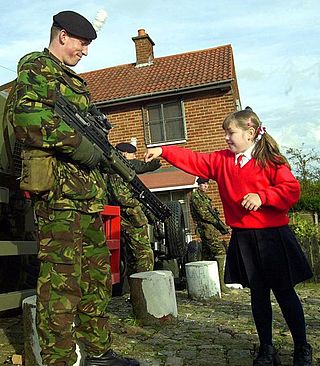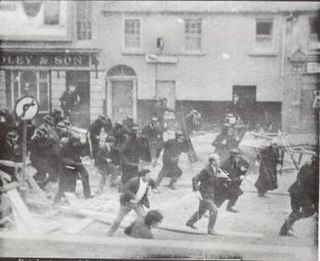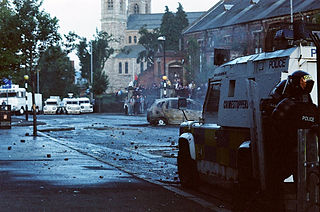Contents
| |||||
| Centuries: | |||||
|---|---|---|---|---|---|
| Decades: | |||||
| See also: | |||||
Events during the year 1986 in Northern Ireland .
| |||||
| Centuries: | |||||
|---|---|---|---|---|---|
| Decades: | |||||
| See also: | |||||
Events during the year 1986 in Northern Ireland .

The Troubles were an ethno-nationalist conflict in Northern Ireland that lasted for about 30 years from the late 1960s to 1998. Also known internationally as the Northern Ireland conflict, it began in the late 1960s and is usually deemed to have ended with the Good Friday Agreement of 1998. Although the Troubles mostly took place in Northern Ireland, at times violence spilled over into parts of the Republic of Ireland, England, and mainland Europe.

The Royal Ulster Constabulary (RUC) was the police force in Northern Ireland from 1922 to 2001. It was founded on 1 June 1922 as a successor to the Royal Irish Constabulary (RIC) following the partition of Ireland. At its peak the force had around 8,500 officers, with a further 4,500 who were members of the RUC Reserve.

The Loyalist Volunteer Force (LVF) was an Ulster loyalist paramilitary group in Northern Ireland. It was formed by Billy Wright in 1996 when he and his unit split from the Ulster Volunteer Force (UVF) after breaking its ceasefire. Most of its members came from the UVF's Mid-Ulster Brigade, which Wright had commanded. In a two-year period from August 1996, the LVF waged a paramilitary campaign in opposition to Irish republicanism and the Northern Ireland peace process. During this time it killed at least 14 people in gun and bomb attacks, almost all of them Catholic civilians killed at random. The LVF called off its campaign in August 1998 and decommissioned some of its weapons, but in the early 2000s a loyalist feud led to several killings. Since then, the LVF has been largely inactive, but its members are believed to have been involved in rioting and organized crime. In 2015, the security forces stated that the LVF "exists only as a criminal group" in Mid-Ulster and Antrim.

The Red Hand Defenders (RHD) is an Ulster loyalist paramilitary group in Northern Ireland. It was formed in 1998 by loyalists who opposed the Belfast Agreement and the loyalist ceasefires. Its members were drawn mostly from the Ulster Defence Association (UDA) and Loyalist Volunteer Force (LVF). The name had first been used by Red Hand Commandos dissident Frankie Curry in 1996 and he was the leading figure in what was a somewhat unstructured organization until he was killed in 1999. It is named after the Red Hand of Ulster.
The Northern Ireland peace process includes the events leading up to the 1994 Provisional Irish Republican Army (IRA) ceasefire, the end of most of the violence of the Troubles, the Good Friday Agreement of 1998, and subsequent political developments.

The Holy Cross dispute occurred in 2001 and 2002 in the Ardoyne area of north Belfast, Northern Ireland. During the 30-year conflict known as the Troubles, Ardoyne had become segregated – Ulster Protestants and Irish Catholics lived in separate areas. This left Holy Cross, a Catholic primary school for girls, in the middle of a Protestant area. In June 2001 – during the last week of school before the summer break – Protestant loyalists began picketing the school, claiming that Catholics were regularly attacking their homes and denying them access to facilities.

The Battle of the Bogside was a large three-day riot that took place from 12 to 14 August 1969 in Derry, Northern Ireland. Thousands of Catholic/Irish nationalist residents of the Bogside district, organised under the Derry Citizens' Defence Association, clashed with the Royal Ulster Constabulary (RUC) and loyalists. It sparked widespread violence elsewhere in Northern Ireland, led to the deployment of British troops, and is often seen as the beginning of the thirty-year conflict known as the Troubles.

Ulster loyalism is a strand of Ulster unionism associated with working class Ulster Protestants in Northern Ireland. Like other unionists, loyalists support the continued existence of Northern Ireland within the United Kingdom, and oppose a united Ireland independent of the UK. Unlike other strands of unionism, loyalism has been described as an ethnic nationalism of Ulster Protestants and "a variation of British nationalism". Loyalists are often said to have a conditional loyalty to the British state so long as it defends their interests. They see themselves as loyal primarily to the Protestant British monarchy rather than to British governments and institutions, while Garret FitzGerald argued they are loyal to 'Ulster' over 'the Union'. A small minority of loyalists have called for an independent Ulster Protestant state, believing they cannot rely on British governments to support them. The term 'loyalism' is usually associated with paramilitarism.
The following outline is provided as an overview of and topical guide to the Troubles.

This article recounts the violence and other effects related to The Troubles in Portadown, County Armagh, Northern Ireland. Much of it has been related to the Drumcree parade dispute.

During 12–16 August 1969, there was an outbreak of political and sectarian violence throughout Northern Ireland, which is often seen as the beginning of the thirty-year conflict known as the Troubles. There had been sporadic violence throughout the year arising out of the Northern Ireland civil rights campaign, which demanded an end to discrimination against Catholics and Irish nationalists. Civil rights marches had been attacked by Protestant loyalists, and protesters often clashed with the Royal Ulster Constabulary (RUC), the overwhelmingly Protestant police force.
Events during the year 1985 in Northern Ireland.

The Drumcree conflict or Drumcree standoff is a dispute over yearly parades in the town of Portadown, Northern Ireland. The town is mainly Protestant and hosts numerous Protestant marches each summer, but has a significant Catholic minority. The Orange Order insists that it should be allowed to march its traditional route to and from Drumcree Church on the Sunday before the Twelfth of July. However, most of this route is through the mainly Catholic/Irish nationalist part of town. The residents, who see the march as sectarian, triumphalist and supremacist, have sought to ban it from their area.
The city of Derry, Northern Ireland, was severely affected by the Troubles. The conflict is widely considered to have begun in the city, with many regarding the Battle of the Bogside in 1969 as the beginning of the Troubles. The Bloody Sunday incident of 1972 occurred in Derry, in the Bogside area.

The 2011 Northern Ireland riots were a series of riots between 20 June 2011 and 16 July 2011, starting originally in Belfast, before spreading to other parts of Northern Ireland. They were initiated by the Ulster Volunteer Force.

From 6 to 11 July 1997 there were mass protests, fierce riots and gun battles in Irish nationalist districts of Northern Ireland. Irish nationalists/republicans, in some cases supported by the Provisional Irish Republican Army (IRA), attacked the Royal Ulster Constabulary (RUC) and British Army. The protests and violence were sparked by the decision to allow the Orange Order to march through a Catholic/nationalist neighbourhood of Portadown. Irish nationalists were outraged by the decision and by the RUC's aggressive treatment of those protesting against the march. There had been a bitter dispute over the march for many years.

On 3 December 2012, Belfast City Council voted to limit the days that the Union Flag flies from Belfast City Hall. Since 1906, the flag had been flown every day of the year. This was reduced to 18 specific days a year, the minimum requirement for UK government buildings. The move to limit the number of days was backed by the council's Irish nationalists while the Alliance Party abstained from the vote; it was opposed by the unionist councillors.
The Clontibret invasion was an incursion by Ulster loyalists into the small Monaghan village of Clontibret, in the Republic of Ireland, on 7 August 1986. After crossing the border the loyalists proceeded to vandalise many buildings in the village and attacked two police officers before being dispersed by the Garda Síochána. The incident occurred in the context of unionist opposition to the recently signed Anglo-Irish Agreement.
On 12 July 2001, major rioting and civil disorder broke out in Ardoyne, north Belfast, Northern Ireland. In some of the worst rioting in years, 113 police officers were injured in clashes which followed a July 12 parade. Police were attacked when trying clear the path for about 100 Orangemen returning from the parade to go along a main road passing the Catholic Ardoyne area.
A series of riots in loyalist areas of Northern Ireland began in Waterside, Derry, on 30 March 2021. After four nights of rioting in Derry, disturbances spread to south Belfast on 2 April, where a loyalist protest developed into a riot involving iron bars, bricks, masonry and petrol bombs. Following this, civil unrest spread to Newtownabbey on 3 April, where cars were hijacked and burnt, and petrol bombs were also used against police. Carrickfergus in southern County Antrim also saw serious civil unrest on the night of 4 April and morning of 5 April, where loyalists created roadblocks to keep police out of local estates and threw petrol bombs at police vehicles.